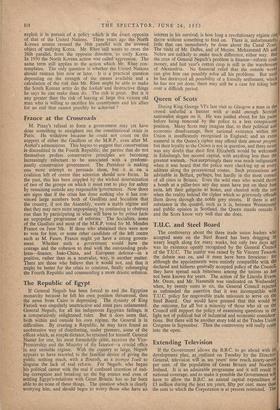The Republic of Egypt
If General Neguib has been forced to end the Egyptian monarchy because he felt his own position threatened, then the news from Cairo is depressing. The dynasty of King Farouk was singularly unattractive and must pass unlamented. General Neguib, for all his indigenous Egyptian failings, is a comparatively enlightened ruler. But it does seem that, both within and outside his own regime, the General is in difficulties. By creating a Republic, he may have found an unobtrusive way of distributing, under pressure, some of the offices which, as simple dictator, he retained for himself. General Nasser for one, his most formidable critic, receives the Vice- premiership and the Ministry of the Interior—a crucial office )n any unstable regime. With the country at large, Neguib appears to have resorted to the familiar device of giving the public nothing much, with a flourish, as a trompe l'oeil to disguise the lack of real reform. For Neguib, who began 'his political career with the real if confused intention of end- ing corruption and breaking up the big estates and even of settling Egypt's relations with Great Britain, has so far been able to do none of these things. The question which is clearly worrying him, and should begin to worry those who have an interest in his survival, is how long a revolutionary regime can thrive without something to feed on. There is, unfortunately, little that can immediately be done about the Canal Zone. The visits of Mr. Dulles, and of Messrs. Mohammed Ali and Nehru are unlikely to make much difference, either way. But the crux of General Neguib's problem is finance—reform costs money, and last year's cotton crop is still in the warehouses of Alexandria. No financial relief that the outside world can give him can possibly solve all his problems. But until he has destroyed all possibility of a friendly settlement, which he has not yet done; there may still be a case for tiding hint over a difficult period.


































 Previous page
Previous page